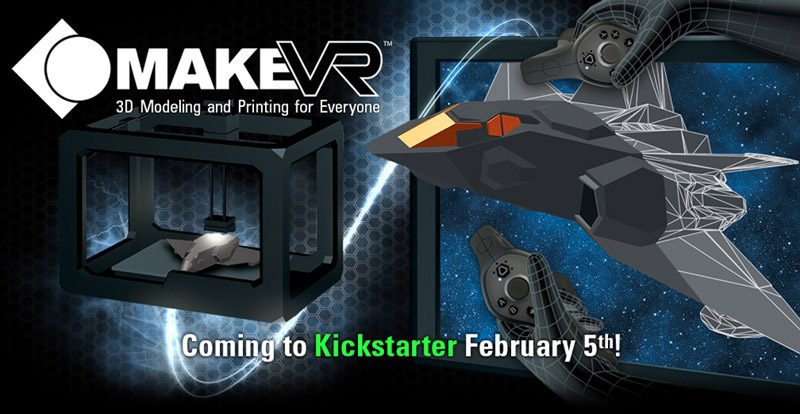Today Sixense launches their Kickstarter for MakeVR, an impressive piece of software that seeks to make computer aided design so easy that anyone can do it. With support for the Razer Hydra or STEM System, the Oculus Rift, and up to five collaborative builders, MakeVR is set to be one of the first bits of seriously productive Oculus Rift software.
Accessible
Accessibility is clearly key to Sixense’s MakeVR ambitions. While other computer aided design (CAD) software packages may be priced upwards of several thousand dollars, the MakeVR Kickstarter is offering an early-bird price of $169 for the basic version of the software, or $259 for MakeVR with Collaborate3D, enabling multiplayer support with up to five players for collaborative CAD.
Price isn’t the only thing that’s accessible. MakeVR is designed from the ground up with a natural two-handed interface which uses Sixense’s Razer Hydra or forthcoming STEM motion input controllers. The interface, which Road to VR had a chance to preview at GDC 2013 with the Hydra and at CES 2014 with the STEM controllers, allows users to start navigating and working in the CAD environment in minutes.
Sixense tells us that they plan to include several modes, from beginner to expert, which will help train players on how to navigate and build in MakeVR. As users complete learning tasks, they’ll graduate up through the ranks to eventually have expert level control over the software, including precision modeling tools like grids, jigs, snap points, and more.
At CES 2014, Sixense showed us an impressively slick workflow for turning your virtual creations into real 3D printed objects. After making a quick model, we watched the user pull out MakeVR’s virtual tablet interface and, with the press of a single button, upload their creation to the Shapeways 3D printing service. You could literally go from an idea to printing a real physical model in just a few minutes.
Collaborative & Virtual
As someone who has played Minecraft (2011) for several years, collaborative building in MakeVR definitely piques my interest. MakeVR with Collaborate3D allows up to five players in one space, all building together, with voice chat. Their avatars are represented as floating robots that twist, flip, and change size according to the scale of the world that each player is working with.
“MakeVR supports the use of 3D monitors and full immersion with virtual reality head mounted displays (HMDs). In fact, MakeVR was originally conceived with VR in mind, even before HMDs were widely available,” reads the Kickstarter. And we believe it—when we saw MakeVR in action at GDC 2013, more than 10 months ago, they had already implemented support for the just-released Oculus Rift DK1. Using MakeVR with the Rift is even more intuitive than on a standard monitor; you can imagine that seeing in 3D, when trying to build and manipulate 3D objects, would be very useful—the addition of depth perception makes things way easier.
MakeVR Kickstarter Reward Tiers
As ever, we like to cut through the clutter and lay the offer right on the table. Here are the core tiers of the MakeVR Kickstarter:
- [$169] MakeVR—Software Only (Early Bird, limit 500): Basic version of MakeVR without controllers or collaboration.
- [$199] MakeVR—Software Only: Basic version of MakeVR without controllers or collaboration.
- [$259] MakeVR w/ Collaborate3D—Software Only (Early Bird, limit 500): Full version of MakeVR with collaboration; controllers not included.
- [$299] MakeVR w/ Collaborate3D—Software Only: Full version of MakeVR with collaboration; controllers not included.
- [$399] MakeVR Basic w/ STEM (Early Bird, limit 1000): Basic version of MakeVR and STEM System with two controllers. Collaboration not included.
- [$479] MakeVR Basic w/ STEM: Basic version of MakeVR and STEM System with two controllers. Collaboration not included.
- [$499] MakeVR w/ Collaborate3D (Early Bird, limit 1000): Full version of MakeVR and STEM System with two controllers. Collaboration included.
- [$579] MakeVR w/ Collaborate3D: Full version of MakeVR and STEM System with two controllers. Collaboration included.
Sixense plans to ship a private beta of MakeVR in August, with full release of the software in November.







